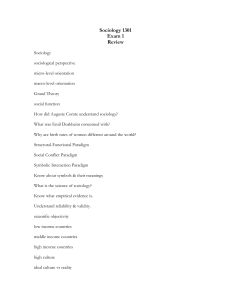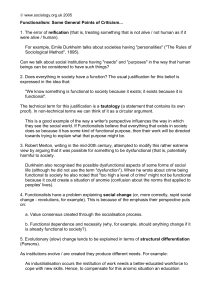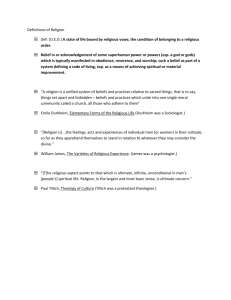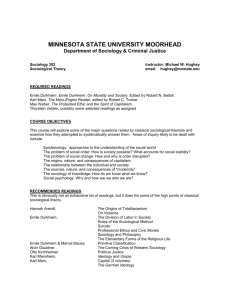Emile Durkheim
advertisement
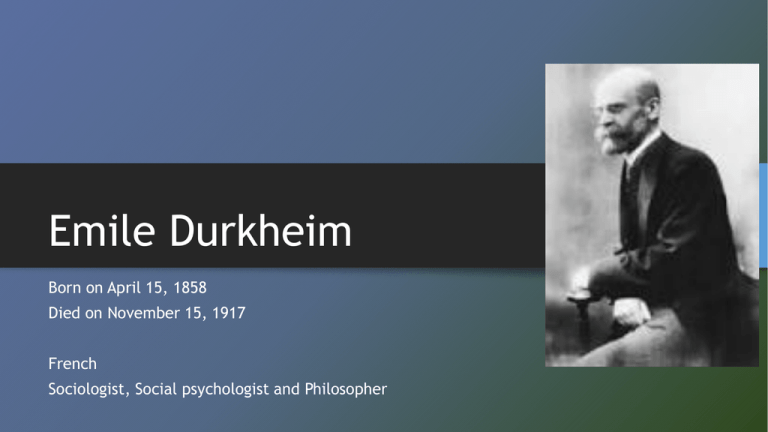
Emile Durkheim Born on April 15, 1858 Died on November 15, 1917 French Sociologist, Social psychologist and Philosopher • Durkheim formally established the academic discipline and, with Karl Marx and Max Weber, is commonly cited as the principal architect of modern social science and father of sociology. Education • He entered the École Normale Supérieure (ENS) in 1879, … and wrote his Latin dissertation on Montesquieu. • He obtained his agrégation in philosophy in 1882 (aggregation: In France, the agrégation is a civil service competitive examination for some positions in the public education system). • From 1882 to 1887 he taught philosophy at several provincial schools. • In 1885 left for Germany, where for two years he studied sociology in Marburg, Berlin and Leipzig. • By 1886, as part of his doctoral dissertation, he had completed the draft of his “The Division of Labour in Society”, and was working towards establishing the new science of sociology. Instruction • He received a teaching appointment in the University of Bordeaux in 1887, where he was to teach the university's first social science course, he taught both pedagogy and sociology (the latter had never been taught in France before). From this position Durkheim helped reform the French school system and introduced the study of social science in its curriculum. • In 1902 he became the chair of education at the Sorbonne. • He became a full professor (Professor of the Science of Education) there in 1906, and in 1913 he was named Chair in "Education and Sociology“. • He also served as an advisor to the Ministry of Education. Other activities • In 1895 he founded the first European department of sociology at the University of Bordeaux. • In 1898, he founded L'Année Sociologique, the first French social science journal. Its aim was to publish and publicize the work of what was a growing number of students and collaborators. Major Concerns • Throughout his career, Durkheim was concerned primarily with three goals: • First, to establish sociology as a new academic discipline. • Second, to analyze how societies could maintain their integrity and coherence in the modern era, when things such as shared religious and ethnic background could no longer be assumed. • Lastly, Durkheim was concerned with the practical implications of scientific knowledge. Methodology • Observation must be as impartial and impersonal as possible, even though a "perfectly objective observation" in this sense may never be attained. • Durkheim was one of the first people to explain the existence and quality of different parts of a society by reference to what function they served in maintaining the quotidian. • He also agreed with his organic analogy, comparing society to a living organism. Durkheim also insisted that society was more than the sum of its parts. • he focused on the study of “social facts”. Durkheim argued that social facts have an independent existence greater and more objective than the actions of the individuals that compose society. • social facts are endowed with a power of coercion. Social facts can be material or immaterial. Thoughts • Society, collective consciousness and culture: • Durkheim saw society as a set of social facts. Even more than "what society is", Durkheim was interested in answering "how is a society created" and "what holds a society together". • He assumes that humans are inherently egoistic, but norms, beliefs and values (collective consciousness) form the moral basis of the society, resulting in social integration. • The importance of another key social fact:” the culture”: • Groups, when interacting, create their own culture and attach powerful emotions to it. Durkheim was interested in cultural diversity, and how the existence of diversity nonetheless fails to destroy a society. • To that, Durkheim answered that any apparent cultural diversity is overridden by a larger, common, and more generalized cultural system, and the law. • One of the main features of the modern, organic society is the importance, sacredness even, given to the concept – social fact – of the individual. The individual, rather than the collective, becomes the focus of rights and responsibilities, the center of public and private rituals holding the society together – a function once performed by the religion. • Durkheim saw the population density and growth as key factors in the evolution of the societies and advent of modernity…. In time, the importance of the state, the law and the individual increases, while that of the religion and moral solidarity decreases. • Social pathologies: • Durkheim noted there are several possible pathologies that could lead to a breakdown of social integration and disintegration of the society: the two most important ones are anomie and forced division of labour; lesser ones include the lack of coordination and suicide. • By anomie Durkheim means a state when too rapid population growth reduces the amount of interaction between various groups, which in turn leads a breakdown of understanding (norms, values, and so on). • By forced division of labour Durkheim means a situation where power holders, driven by their desire for profit, results in people doing the work they are unsuited for. Such people are unhappy, and their desire to change the system can destabilize the society. • Crime: • Durkheim's believed that crime is "bound up with the fundamental conditions of all social life" and serves a social function. He stated that crime implies, "not only that the way remains open to necessary changes but that in certain cases it directly prepares these changes," Examining the trial of Socrates.“ "his crime, namely, the independence of his thought, rendered a service not only to humanity but to his country" as "it served to prepare a new morality and faith that the Athenians needed". • he saw crime as being able to release certain social tensions and so have a cleansing or purging effect in society. • Religion: • “A religion is a unified system of beliefs and practices relative to sacred things, i.e., things set apart and forbidden--beliefs and practices which unite in one single moral community called a Church, all those who adhere to them.” • Durkheim saw religion as the most fundamental social institution of humankind, and one that gave rise to other social forms. It was the religion that gave humanity the strongest sense of collective consciousness. • However, even if the religion was losing its importance for Durkheim, it still laid the foundation of modern society and the interactions that governed it. And despite the advent of alternative forces, Durkheim argued that no replacement for the force of religion had yet been created. Major Works • • • • • • • • • • • Montesquieu's contributions to the formation of social science (1892) The Division of Labour in Society (1893) The Rules of Sociological Method (1895) On the Normality of Crime (1895) Suicide (1897) The Prohibition of Incest and its Origins (1897) Sociology and its Scientific Domain (1900) Primitive Classification (1903) (in collaboration with Marcel Mauss) The Elementary Forms of the Religious Life (1912) Who Wanted War? (1914), in collaboration with Ernest Denis Germany Above All (1915) • Published posthumously: • Education and Sociology (1922) • Sociology and Philosophy (1924) • Moral Education (1925) • Socialism (1928) • Pragmatism and Sociology (1955)

